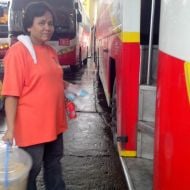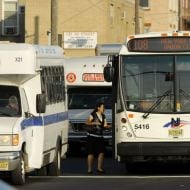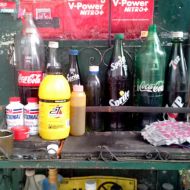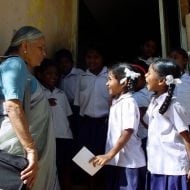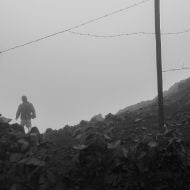Self-Appointed Traffic Cops Who are Always Around When You Need Them
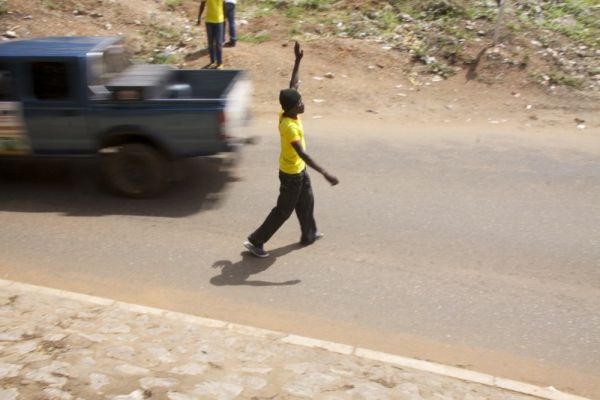
An informal traffic cop keeps cars moving through the tunnel under the Accra-Tema Highway.
“We’ve been here since Jerry John Rawlings,” Junior tells me.
We are sitting on a stone and cement embankment overlooking the tunnel that leads from Shiashie Road to Spintex and passes under the busy four-lane divided highway that runs from Accra to Tema. The traffic from Tema whizzes by above us. Junior is referring to the time of the presidency of J.J. Rawlings, when he started working here.
As we sit talking, a line of cars waiting to pass through the tunnel slowly backs up. A big cargo truck begins blaring its horn. The polished blue SUV in front of it honks twice and accelerates into the tunnel. Perhaps thirty seconds later, it backs out, allowing an oncoming vehicle to pass. The truck blares its horn again.
Junior has a small, slightly tattered bright red flag in his right hand. He’s wearing a neon-yellow reflective vest with the word “Sarkozy” inexplicably emblazoned on the back. These are the tools of his job. On my other side sits his brother and co-worker, Immanuel.
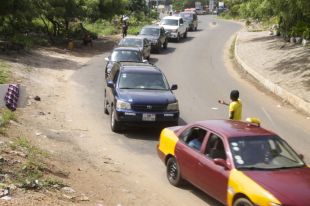
Without Accra’s informal traffic cops, traffic would be even worse than it is.
Immanuel and Junior Lovi are two of eight young men – Kofi, Lucas, Asedo, Eugene (Junior), Barry, Amozo, Anani and Immanuel – who direct the traffic here at the Spintex Bridge. They work in pairs, one at each end of the tunnel, in four-hour shifts from 6 a.m. to 6 p.m.
Traffic into Accra from East Legon starts to build up to a long line down Shiashie Road starting at around 6:30 a.m., and doesn’t ease until after nine. The shortcut under the bridge is only one lane, without lights or stop signs. Unregulated, the traffic will build up on one side in a messy snarl until some courageous soul, hand on horn, rushes the entrance of the tunnel.
Junior, Immanuel and their six companions aren’t paid by the government or any kind of private company. Instead, they ask the drivers for money, and receive it in tiny increments: 10 pesewas, 50 pesewas, the occasional one or two cedi note. It’s a sort of gift economy; they provide a public service, and the appreciative public voluntarily pays. On a good day, Junior tells me, he might make 20 cedis. Other days it’s 12 or 15. “It’s just chop money,” he says.
Each of the brothers is helping to support a wife and two children. They also drive cars occasionally to make money, and they are saving to buy their own taxi. Sometimes, Immanuel says, they are sponsored — a company gives them money to wear T-shirts advertising its brand. He points to his bright yellow T-shirt advertising Ashfoam, a local mattress manufacturer. Apparently, Ashfoam gave them T-shirts, but no money.
East Legon is a wealthy suburb, and the brothers, who themselves have lived for more than ten years in plywood shacks they constructed themselves on a vacant lot on Spintex, are very aware of that fact. They see the fancy cars – Toyotas, BMWs, Benzes, “even Range Rovers” – and the “big men” driving by in them. Many of them occasionally give the brothers money. Those who never give them money, though, they rattle off; I recognize the names of political, religious and business leaders. “They go fit pass,” he adds, “they no dey give us nothing.” These men are quietly keeping tabs on the relative generosity of Accra’s elite.
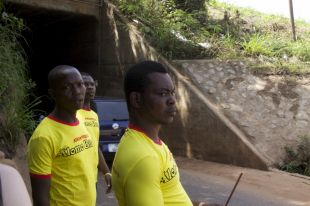
The informal team of traffic cops at the entrance to the tunnel.
They started this work soon after the tunnel opened, in 1994, when the route was still a small, unpaved road linking a sparsely populated suburb to a sparsely occupied commercial road. Their oldest brother, Kofi, had recently moved to Accra from Hohoe, a small town in the northern Volta Region. Soon after he, alone, started directing the traffic here and making money from the work, he called for his brothers to come and join him in Accra. Eventually, a total of six of the brothers came to work at the bridge. Three others joined them, though one recently died in an altercation with an armed robber.
There were rumors for a long time that the men directing traffic at the Spintex Bridge were also responsible for a spate of armed robberies. Sometimes, other people come at night to take over when Immanuel and Junior’s group leaves; these men got a bad reputation. “There appear to be two sets of people who man the tunnel,” a friend of mine who resides in East Legon told me. “There’s a good set and a bad set. The bad set reached into my stepmother’s open window and stole her handbag once, at night when she was passing though.”
During this rash of thefts, the brothers tell me, they were originally suspects, and the police tried to drive them out. Junior says that in fact the brothers tried to keep the robbers away; a sensible move, since whispers of thievery would drive away their business. One of the robbers, frustrated by their crime-inhibiting presence, chased the now-deceased man with a cutlass, forcing him to dash onto the highway, where he was hit by a car.
Now things seem to have calmed down, and the police have come to trust this little group of eight private public servants, even occasionally giving them a bit of money. “We direct the cars to avoid accidents,” Junior says. Two cars could collide in the tunnel. “We dey solve that problem [for the police].”
Public service is actually a whole sector of informal work in Accra. In construction zones where traffic is reduced to one lane, you’ll find young men directing the flow of vehicles for bits of spare change. Unregulated intersections can become tangles of traffic during rush hour unless a policeman or one of these informal traffic cops comes to sort it out. When the power goes out – “dum so, dum so,” as people joke or resignedly sigh, which literally translates as “on off, on off” – traffic lights often go dark with it. Men like these help out, earning a few pesewas from a grateful public along the way.
Recently, when I was riding in a friend’s old truck, we broke down at one of the busiest traffic interchanges in the city, right beside Accra Mall. Ghana’s informal Triple-A kicked right in. A man dashed up to help us, bringing cardboard for my friend to lie on as he looked under the car, then jogged off to fetch a mechanic. Our first responder earned himself a few cedis that way, in addition to the bits of change he gets from helping cars navigate the thick, immovable traffic jam that always forms there between five and seven in the evening.
These first responders and traffic directors are never far away in Accra, always eager to help out. They rarely demand money, and I’ve had plenty of people happily help me even when I haven’t given out cash, and some have even refused payment. But enough are able to earn a bit of money for their kindness. As Immanuel explains to me,“Some days, they no get money. Others days, they give money.” Both brothers wish, though, that they would be officially hired by the government, paid a salary, given uniforms and attendant respect for the service they provide. As Junior says, before he runs down the hill to wave through the waiting traffic, “We help the nation.”
Photos by Seton Nicholas

